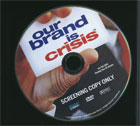
Our Brand is Crisis 2005
Distributed by Cinema Guild, 115 West 30th Street, Suite 800, New York, NY 10001; 212-685-6242
Produced by Rachel Boynton
Directed by Rachel Boynton
DVD, color, 87 min.
Sr. High - Adult
Political Science, Latin American Studies
Date Entered: 04/23/2007
Reviewed by Timothy W. Kneeland, History and Political Science Department, Nazareth College of Rochester, Rochester, NYOur Brand is Crisis follows the machinations of leading U.S. political consultants to aid former Bolivian President (1993-1997), Gonzalo Sanchez de Lozada, known as “Goni,” in his 2002 reelection bid. The film is compelling and highly recommended. Viewers are treated to an American-style campaign outside of the U.S. which affords an emotional detachment and clarity of the political techniques not afforded even by classic documentaries such as the War Room. In addition the film is timely. Political consulting firms such as GCS have a growing number of clients abroad due to the increasing number of democratically elected regimes increasing across the globe and this film provides a compelling case study of the export of American electioneering in Bolivia.
The filmmaker, Rachel Boynton, follows employees of the political consulting firm of Greenberg, Carville and Shrum (GCS) who have been hired by Goni to export American style election techniques to the impoverished and strife-torn nation of Bolivia. The film does an excellent job exposing the inside of American political campaigns by following. Jeremy Rosner, the point person for GCS in Bolivia, from the beginning of the campaign until well after the end. American candidates for political office are packaged and branded to elicit voter support, and this same scenario is used in Bolivia.
Rosner uses sophisticated polling techniques and focus groups to market Goni. The experts determine that the theme of the campaign will be that Bolivia is in “crisis, ” but that Goni has the experience and ideas to save the country. The message is packaged to be, in the words of political guru James Carville, “Relevant, Simple and Repetitive.” Alas for the consultants, they find that Goni is a hard sell. Focus groups brought in by the Americans indicate that Goni is perceived as arrogant, out of touch with ordinary Bolivians, and that his ideas are unpopular ones he has recycled from his term in office, 1993-1997. This leads to the next strategy of GCS, go negative. Rosner and associates skillfully enlist the press as a surrogate to raise questions about the character and honesty of another candidate for the presidency. They do this not to gain voters for Goni but to disperse the anti-Goni vote among the other candidates. The end result of the packaging and branding of Goni appears successful as Goni is elected president of Bolivia in June, 2002, with 22.5% of the vote. However, like much the campaign they ran, appearances are deceiving. Although these political consultants were able to convince a sufficient number of voters to elect Goni, the new president lacks the support of the Bolivian people. Goni and his ideas remain unpopular and his political rivals lead demonstrations against him and his government. When the demonstrators are met with deadly force dozens are left dead. Crisis, the marketing brand of the campaign, becomes the political reality of the new government. The film implies that the violence and unrest in Bolivia are the result of the meddling by Rosner and his made-in-America tactics. Within eight months of his election, Goni is forced out of power and seeks exile in the United States. Eventually, new elections are held in Bolivia, this time without the machinations of American political consultants, and a new president takes power with 70% of the popular vote, which the filmmaker implies is a victory for democracy over the machinations of the American pollsters and political insiders.
Recommended for high school through adult audiences.